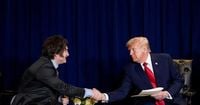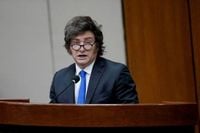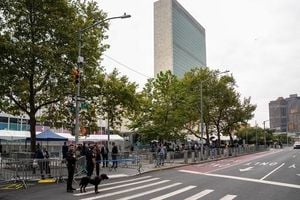In a week of high-stakes diplomacy and economic maneuvering, U.S. President Donald Trump and Argentine President Javier Milei took center stage at the United Nations General Assembly in New York, where the fate of Argentina’s battered economy and its relationship with Washington hung in the balance. The September 23, 2025, meeting between the two leaders came as Argentina, already the International Monetary Fund’s (IMF) largest debtor, faced a fresh wave of financial turmoil—plummeting currency values, surging unemployment, and mounting political headwinds.
Despite the gravity of Argentina’s economic woes, President Trump struck an optimistic note, telling reporters, “We’re gonna help them but I don’t think they need a bailout. He’s doing a fantastic job,” referring to Milei, his self-described “anarcho-capitalist” ally. According to Reuters, Trump doubled down on his endorsement, stating, “We are giving the president of Argentina our full backing and endorsement,” and even echoed his own campaign slogan, urging, “We need to make Argentina great again.”
Trump’s support was more than just rhetorical. On the eve of the meeting, U.S. Treasury Secretary Scott Bessent announced that “all options for stabilization are on the table” for Argentina, signaling the possible deployment of the powerful U.S. Exchange Stabilization Fund (ESF). The ESF, a $219.5 billion reserve dating back to 1934, has historically been used to shore up global markets during crises, from Mexico’s peso meltdown in the 1990s to the 2020 COVID-19 pandemic response.
According to Reuters, Bessent told reporters, “U.S. support for Argentina will provide a short-term boost both to the peso and the government’s standing in the midterm elections.” The mere hint of U.S. intervention sent the Argentine peso and other assets soaring, reversing steep losses from the previous week. Argentina’s Merval stock index surged by about 6%, and the peso strengthened by more than 2%, as reported by Maeil Business Newspaper. Financial markets, ever sensitive to Washington’s signals, responded with renewed optimism—even as the specifics of any U.S. action remained undecided by late Tuesday.
For President Milei, who took office in late 2023 on a wave of investor enthusiasm for his free-market reforms, the meeting with Trump was a much-needed show of international backing. Milei’s austerity measures—symbolized by his penchant for posing with chainsaws to “cut off rampant populism and bureaucracy”—have delivered dramatic results on inflation. Monthly inflation, which reached a staggering 26% in December 2024, plummeted to just 1.9% by July 2025, according to Maeil Business Newspaper.
But the gains have come at a steep cost. Argentina’s unemployment rate jumped from 5.7% at the end of 2023 to 7.6% in the second quarter of 2025. Public support for Milei has eroded, especially after his party’s stinging defeat in Buenos Aires’ provincial elections on September 7, 2025—a critical blow in a region home to nearly 40% of the nation’s population. As if economic headwinds weren’t enough, Milei has also been dogged by a corruption scandal involving his sister, further complicating his political future ahead of next month’s general election.
Still, Milei remained effusive in his gratitude toward Washington. “Thank you very much, President Donald Trump, for your great friendship and this extraordinary gesture,” he posted on X (formerly Twitter). He also emphasized the importance of international alliances, stating, “Countries that defend freedom must cooperate for the prosperity of their people.”
The U.S. Treasury’s ESF, while boasting headline assets of $219.5 billion, actually has less than $30 billion in liquid funds available for rapid deployment, as noted by the Atlantic Council and the Council on Foreign Relations. Experts argue this is still more than sufficient to stabilize a country like Argentina, which, despite its economic turbulence, is not considered systemically critical to the global financial system. The ESF has a storied history—most famously, it underwrote a $20 billion rescue for Mexico in 1994, a move that was repaid ahead of schedule and credited with averting a broader regional crisis.
Yet, not everyone in Washington is thrilled about the prospect of using American taxpayer funds to prop up Argentina’s markets. Democratic Senator Elizabeth Warren voiced sharp criticism, writing to Bessent, “At a time when Americans are struggling to afford groceries, rent, credit card bills, and other debt payments ... it is deeply troubling that the president intends to use significant emergency funds to inflate the value of a foreign government’s currency and bolster its financial markets.” Her concerns reflect a broader skepticism in some quarters about the wisdom and fairness of such international interventions, especially given Argentina’s long and checkered history of over-borrowing, hyperinflation, and serial defaults.
Indeed, the country’s reputation for financial instability looms large. “Markets have had over 100 years of Argentine over-borrowing, hyperinflation and serial defaults, and so when Argentina hits the skids, investors remember that,” said Mark Sobel, a former U.S. Treasury and IMF official, to Reuters. “And they’re not going to go, ‘Milei is different.’”
On the ground in Argentina, the central bank has burned through more than $1.1 billion in just four days trying to defend the peso. Meanwhile, the country faces a daunting $10 billion repayment to the IMF in the first half of 2026. The World Bank, for its part, announced it would accelerate $4 billion in public-private investments for Argentina, prioritizing key sectors such as mining, energy, and tourism—but stopped short of announcing specific projects.
Despite the political theater and market rallies, the path ahead remains fraught. Analysts warn that any U.S. support, especially if offered without strict conditions, could simply finance capital flight rather than address Argentina’s underlying problems. The Treasury’s offer of “large and forceful” actions—ranging from currency swaps to direct purchases of pesos or Argentine dollar-denominated debt—reflects both the urgency of the moment and the limits of what Washington can realistically achieve.
For President Trump, the crisis is also a chance to project American influence in Latin America, supporting a leader whose ideology and style mirror his own. As Claudio Zampa, founder of Mangat Capital Management, told Bloomberg, “He [Milei] is a strategic and geopolitical ally at a time when the United States is trying to build a block of like-minded governments in Latin America.”
As the dust settles on a dramatic week, Argentina’s future is still uncertain. The country stands at a crossroads, buoyed by international support but weighed down by a legacy of financial mismanagement and political turmoil. Whether the latest round of U.S. backing will mark a turning point—or simply another chapter in a long saga of crisis and recovery—remains to be seen.





